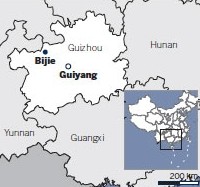

Bijie, a mountainous city in Guizhou province, has an ambitious plan to become southern China's energy hub with an economic value of about 130 billion yuan ($21 billion) before 2020, local authorities say.
But before that can happen, the city must balance economic development and environmental concerns.
For Bijie Mayor Chen Changxu, that means not only upgrading and transforming the development methods of traditional industries such as coal, but also encouraging the development of new energy, including wind and hydro power, to power the city's future green economic engine.
"To protect the city's fragile bio-environment, we are focusing on transforming industrial energy efficiency and boosting renewable energy," said Chen, also a deputy to the National People's Congress, in an interview with China Daily during the recently concluded annual NPC session in Beijing.
Chen said Bijie will introduce high-tech industry that uses the Beidou Navigation Satellite System, clean-energy vehicles and sustainable energy.
Bijie plans to build 40 wind farms with a total capacity of 2 million kilowatts by 2018, according to the city government's plan.
The plan estimated that clean energy in Bijie will account for 20 percent of the city's energy output by 2020.
As for coal, the city's main industry, Chen said small- and medium-scale coal mills will be merged and reorganized.
To minimize the effects of overmining, the number of mines was reduced from 940 in 2000 to the current 536, with total output reaching 117 million metric tons per year, data from the city government showed.
"Coal mines with a capacity below 150,000 tons per year will be shut down gradually," Chen said.
Bijie is in northwestern Guizhou province, bordering Sichuan province to the north and Yunnan province to the west. Exploitable reserves of coal reached nearly 76 billion tons, scattered over 12,000 square kilometers, about 45 percent of the city's total area.
"Overexploitation of coal caused many environmental issues such as land subsidence, water loss and soil erosion," Chen said.
The city has taken a series of measures to boost the environment.
Forested areas have increased from 400,000 hectares in 1988 to 1.2 million hectares in 2013 in the city, the local government said.
"We are turning our green mountains and waters into our surging gross domestic product," Chen said.
"The closure of small mines is helping the environment, reducing pollution and changing the past economic development mode into a healthy and sustainable one," he added.
Premier Li Keqiang said during the opening ceremony of the NPC session this year that China is declaring war on pollution as the country previously declared war on poverty.
But Bijie's war on poverty and pollution began decades earlier.
In 1988, the State Council designated the city as an experimental zone for "development-oriented poverty alleviation and ecological construction" under a proposal by Hu Jintao, then the province's Party chief.
The city, the only one to lack rail service in the province, is accelerating its infrastructure program.
Chen said the investment in railway projects is more than 1.8 billion yuan. The city's airport started operating in June.
China‘s Xinjiang sizzles with green energy
2014-02-03Global jobs in green energy to triple by 2030
2014-01-22Conference focuses on new energy, green economy
2013-09-27French companies focus on green energy market
2013-09-26Beijing schools to get access to green energy
2013-06-09Green China: Nation's push for clean energy commended
2012-11-27Copyright ©1999-2018
Chinanews.com. All rights reserved.
Reproduction in whole or in part without permission is prohibited.